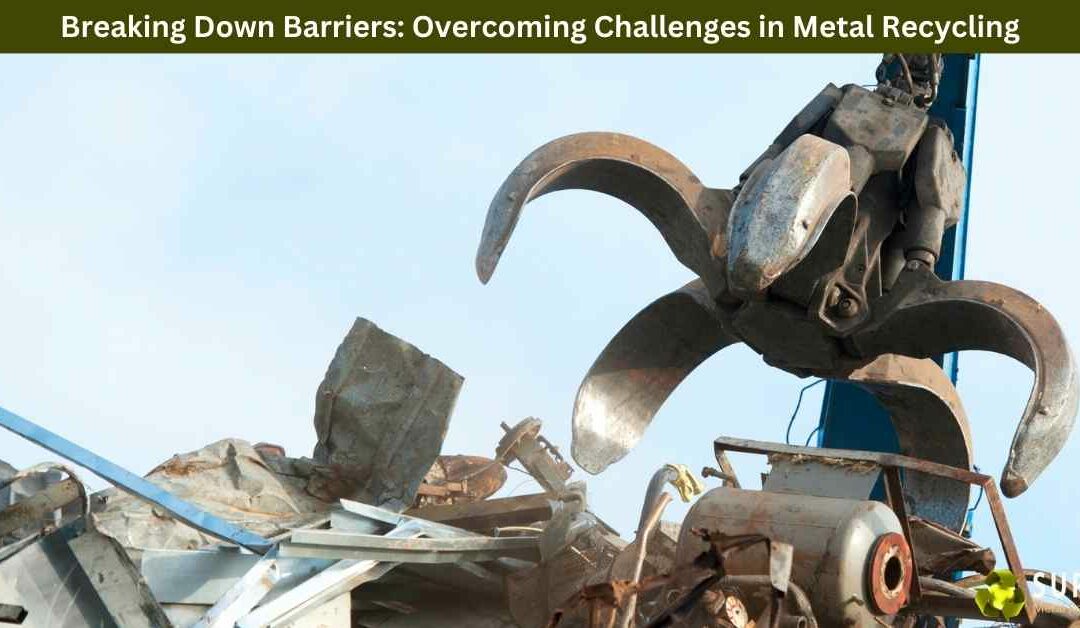Metal recycling stands at the forefront of sustainability efforts, offering a vital solution to the world’s growing waste management problem. However, despite its importance, the metal recycling industry faces numerous challenges that hinder its efficiency and growth. In this article, we delve into the barriers that metal recycling companies encounter and explore innovative solutions to overcome them. As a leading metal recycling company in Melbourne, Victoria, we understand these challenges firsthand and are committed to overcoming them for a greener, more sustainable future.
Economic Challenges: One of the primary barriers to metal recycling is the fluctuating economic landscape. The prices of metals are subject to market forces, which can be unpredictable and volatile. During economic downturns, the demand for metals decreases, leading to lower prices and reduced profitability for recycling companies. Additionally, the cost of transportation and processing further impacts the economics of metal recycling.
Solution: To mitigate economic challenges, metal recycling companies must diversify their revenue streams and adapt to market fluctuations. This may involve investing in advanced sorting and processing technologies to increase efficiency and reduce operating costs. Moreover, building strong partnerships with manufacturers and industries that rely on recycled metals can help stabilize demand and prices.
Technological Constraints: Another obstacle faced by metal recyclers is the lack of advanced technology for sorting and processing metal scrap. Traditional methods often rely on manual labor and outdated machinery, resulting in inefficiencies and high operational costs. Additionally, the complexity of sorting different types of metals poses a significant challenge, as certain alloys and compositions require specialized equipment for separation.
Solution: Investing in state-of-the-art technology is essential for overcoming technological constraints in metal recycling. Automated sorting systems equipped with advanced sensors and artificial intelligence can accurately identify and separate various types of metals, streamlining the recycling process and reducing labor costs. Furthermore, continuous research and development efforts are necessary to innovate new recycling technologies that improve efficiency and sustainability.
Environmental Concerns: While metal recycling is inherently eco-friendly compared to mining and manufacturing virgin materials, it still poses environmental challenges. The recycling process consumes energy and generates emissions, contributing to carbon footprint and air pollution. Moreover, improper handling of metal waste can lead to soil and water contamination, posing risks to human health and ecosystems.
Solution: To address environmental concerns, metal recycling companies must prioritize sustainability in their operations. Implementing energy-efficient practices and investing in renewable energy sources can reduce the carbon footprint of recycling facilities. Additionally, stringent waste management protocols should be established to minimize environmental impact and ensure compliance with regulatory standards. Collaborating with environmental organizations and government agencies can also facilitate the adoption of eco-friendly practices within the industry.
Supply Chain Complexity: The metal recycling supply chain is complex, involving multiple stakeholders such as scrap collectors, processors, manufacturers, and end-users. Coordinating logistics and ensuring the quality of recycled materials throughout the supply chain presents significant challenges. Moreover, the global nature of the metal market introduces additional complexities related to international trade regulations and geopolitical factors.
Solution: Streamlining the metal recycling supply chain requires effective communication and collaboration among stakeholders. Digital platforms and blockchain technology can enhance transparency and traceability, enabling real-time tracking of materials from collection to final processing. Establishing strategic partnerships with reliable suppliers and customers can also strengthen the resilience of the supply chain and mitigate risks associated with market volatility and geopolitical instability.
Metal recycling plays a crucial role in mitigating environmental impact and conserving natural resources, but it faces various challenges that must be addressed to realize its full potential. By overcoming economic, technological, environmental, and supply chain barriers, metal recycling companies can enhance efficiency, profitability, and sustainability. As a leading metal recycling company in Melbourne, Victoria, we remain committed to overcoming these challenges and driving positive change in the industry. Together, we can build a greener, more sustainable future for generations to come.
If you are in Glen Waverley, Victoria 3150, and looking for a metal recycling service, this is the best way to visit us.
Super Metal Recycling
345 Frankston – Dandenong Road, Dandenong South VIC 3175
(03) 9706 4909


Recent Comments